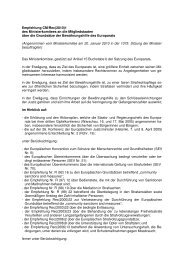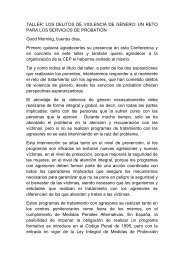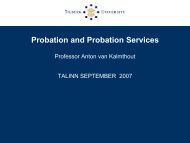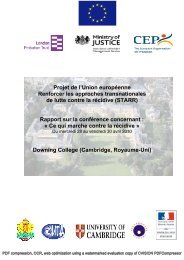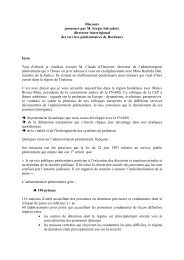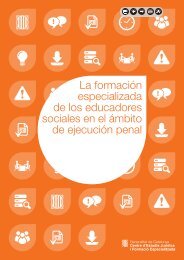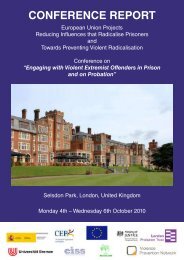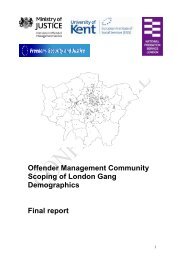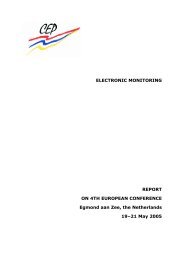Monitoring Hate Crime - CEP, the European Organisation for ...
Monitoring Hate Crime - CEP, the European Organisation for ...
Monitoring Hate Crime - CEP, the European Organisation for ...
You also want an ePaper? Increase the reach of your titles
YUMPU automatically turns print PDFs into web optimized ePapers that Google loves.
cases registered might belong to <strong>the</strong> category of criminal discrimination, but <strong>the</strong> definitions<br />
used in <strong>the</strong> Monitor on Racism and Extremism are not always <strong>the</strong> legal definitions. That<br />
makes it difficult, perhaps even impossible, to use <strong>the</strong> data of this Monitor toge<strong>the</strong>r with <strong>the</strong><br />
data registered in connection with prosecuting and sentencing specific criminal<br />
discrimination. 13<br />
3.4 Recent Dutch research on criminal discrimination<br />
3.4.1 Introduction<br />
In <strong>the</strong> Ne<strong>the</strong>rlands research on criminal discrimination took place recently covering <strong>the</strong> period<br />
2000 – 2005. 14 It was initiated by <strong>the</strong> Dutch Permanent Parliamentary Committee on Justice<br />
in 2006 that wanted to be in<strong>for</strong>med on <strong>the</strong> use of criminal law in <strong>the</strong> fight against<br />
discrimination and on <strong>the</strong> question whe<strong>the</strong>r present sentences were high enough and effective.<br />
The research tried to determine in which way <strong>the</strong> Department of Public Prosecution and <strong>the</strong><br />
courts dealt with cases of criminal discrimination.<br />
For what concerns specific criminal discrimination all data registered in <strong>the</strong> Ne<strong>the</strong>rlands<br />
between 2000 and 2005 were analysed in this research. There<strong>for</strong>e principally <strong>the</strong> research<br />
result answers <strong>the</strong> quantitative question of “how often was a certain decision taken” <strong>for</strong> <strong>the</strong><br />
whole country.<br />
Never<strong>the</strong>less <strong>the</strong> fact that <strong>the</strong>re were only relatively few cases registered makes it probable<br />
that <strong>the</strong> dark number of cases is high and consequently <strong>the</strong>re exist certain reserves about <strong>the</strong><br />
representativeness of <strong>the</strong> cases that came to <strong>the</strong> attention of <strong>the</strong> police.<br />
In <strong>the</strong> field of common criminal discrimination <strong>the</strong> lack of data is even greater. Accordingly<br />
<strong>the</strong> research could only be based on 91 case studies. That means <strong>the</strong> results cannot offer more<br />
than a first impression of what is reality in this field.<br />
3.4.2 Some results of <strong>the</strong> research on specific criminal discrimination<br />
Between 2000 and 2005, <strong>the</strong> Dutch Public Prosecution Service issued 803 summonses – on<br />
average 58% of <strong>the</strong> 1.453 specific discrimination offences that came to <strong>the</strong> attention of <strong>the</strong><br />
13 Ch. Brants, R. Kool, A. Rignalda, Strafbare discriminatie, WODC 2007, p. 213.<br />
14 Ch. Brants, R. Kool, A. Rignalda, Strafbare discriminatie, see above, 2007.<br />
6


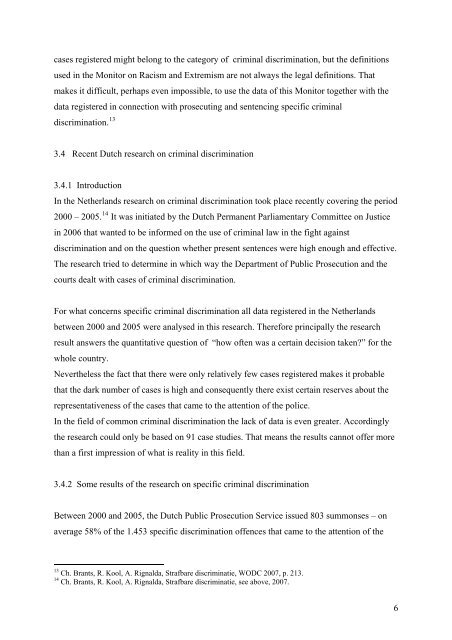
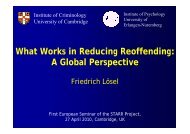
![AGIS2 Nov 08 Conference Report_[Version 2] - CEP, the European ...](https://img.yumpu.com/50764570/1/190x245/agis2-nov-08-conference-report-version-2-cep-the-european-.jpg?quality=85)
